It has been four weeks since rescuers pulled 2-year-old Hamza Malaka from the rubble of his family home in Gaza City.
Four weeks since a stranger in the hospital rhythmically recited the Quran for this toddler who had just become the latest member of the fastest growing club in this Palestinian enclave: wounded children with no surviving family.
And though it has been more than four weeks, some of his 26 family members killed that day still lie beneath their family home and not yet beneath the ground — a violation of the way this predominantly Muslim community would usually lay their loved ones to rest, but a growing reality across Gaza.
“They’re still trying to get the bodies out of those buildings,” said Mohammad Malaka, a relative, who lives in San Diego and remains unsure of the total count buried because, he said, the search is still going on for some of the bodies.
“Imagine how horrific it is,” he told NBC News in a Zoom interview. “They’re gone but you have to wait for days to get those resources to get them out and to give them a proper burial.”
In the wake of the Hamas terror attack, the Israeli military’s deadly bombardment of the Gaza Strip has piled up not just bodies, but also indignities.
In this densely populated and impoverished Palestinian territory — where families have long been forced to become accustomed to loss and laying the dead to rest is often a communal occasion — the war has overturned lives and robbed the dead of traditional funeral rites.
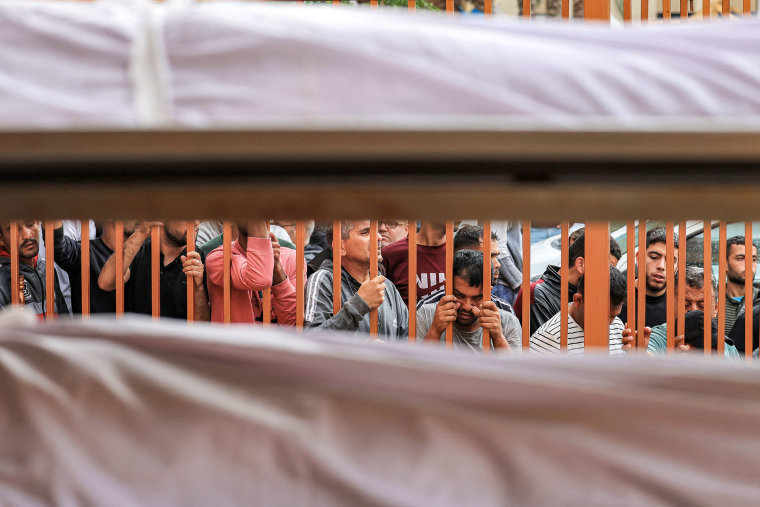
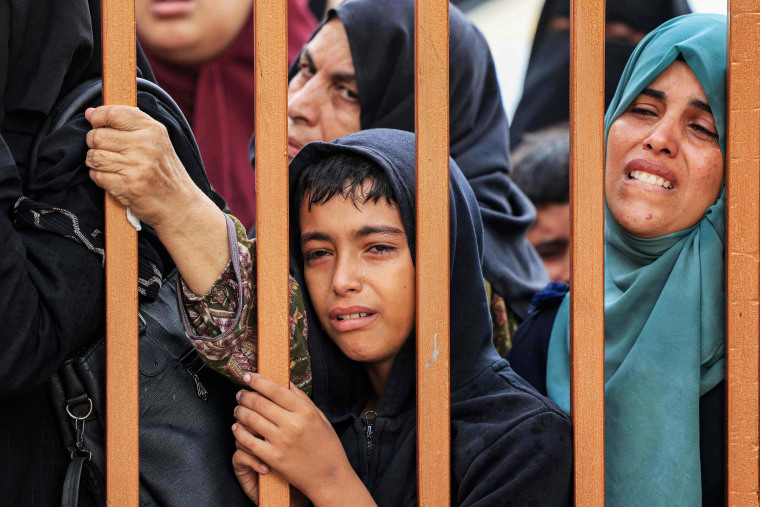
NBC News spoke to several Gaza residents including a gravedigger, a morgue worker and grieving relatives, who detailed overburdened morgues and mass graves filled with unidentifiable bodies in the besieged strip, where health officials say more than 11,200 people have been killed, including more than 4,600 children.
The intensifying Israeli aerial attacks and ground assault are also forcing many to shelter inside, leaving the community with unbearable pain but forced to grieve alone.
“No one can go to the dead’s house because in every house, in every street, in every neighborhood, there is death. So, who comes to whom?” said Mohamed Abu Obaid, 26, a videographer currently sheltering in Khan Younis.
Tens of thousands of Palestinians have fled south, with some of those evacuating by foot describing rotting corpses strewn along roads. Gaza’s main hospital, Al-Shifa, drafted refrigerated food trucks to serve as temporary morgues and help cope with the incoming rush of dead bodies.
But with fuel running out and the hospital surrounded by fighting, workers said they were digging a mass grave inside the complex to bury approximately 170 people. Several doctors said unattended bodies had begun decomposing in the courtyard of Al-Shifa, some preyed on by dogs and unable to be cleaned or buried outside because of the risk of gunfire encircling the hospital.
“The grave we are digging is small,” Al-Shifa Director Medhat Abbas said. “The Shifa hospital turned into a real cemetery for the sick and wounded.”
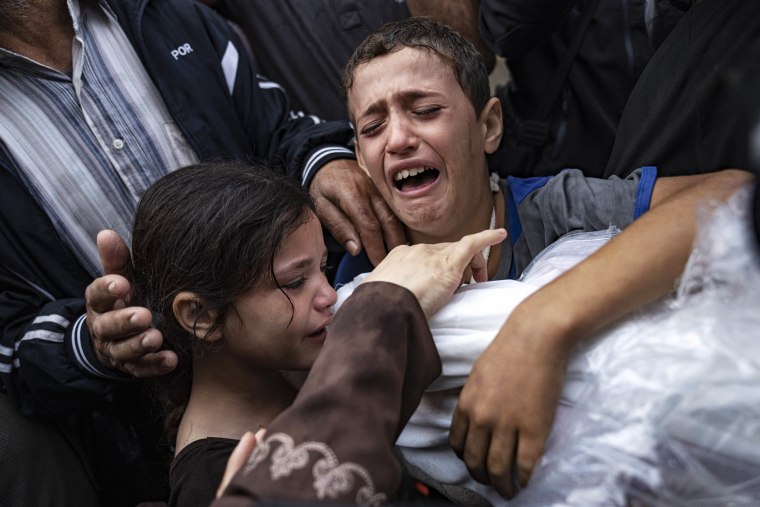
‘They bury them fast’
Before generations of the Malaka family were wiped out, they had resorted to sheltering together: Young children, a pregnant woman and elderly family members packed in a multistory residential complex in the Zaitoun neighborhood of Gaza City.
But the level of destruction in Gaza, which the United Nations says has damaged almost half of all housing units, has hampered first responders’ ability to retrieve the dead and wounded. An estimated 2,700 people, including 1,500 children, have been reported missing, believed to be trapped or dead under the rubble, according to the U.N.
Muslims strive to bury their dead within 24 hours and no later than three days in adherence to Islamic burial traditions, which emphasize laying the body to rest quickly in its natural state to preserve the dignity of the dead.
In non-war times, funeral processions and mourning rituals in Gaza would be attended in the thousands, according to locals. Mourners would usually gather around the body in a mosque to pray for the dead, followed by a large procession from the mosque to the gravesite for burial. The bereaved family would then host members of the community in their home to pay their respects for at least three days of mourning, if not longer.
But now, the “enormous” influx of bodies means that once a death is pronounced by a medical examiner, hospital staff quickly wrap the body in a burial cloth and move it from the mortuary to the outdoor hospital yard, according to Saeed Elshorbagy, a morgue worker in Khan Younis’ Nasser Hospital.
Then, any family members present are encouraged by medical staff to take it directly to a burial site with “minimal people.”
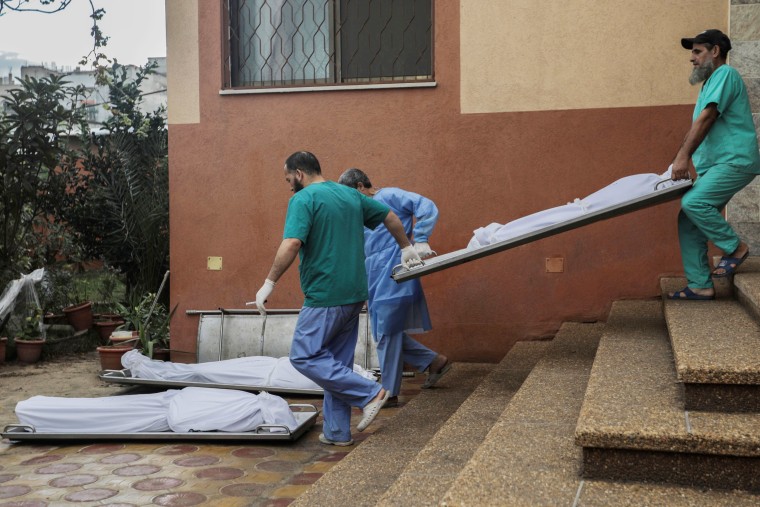
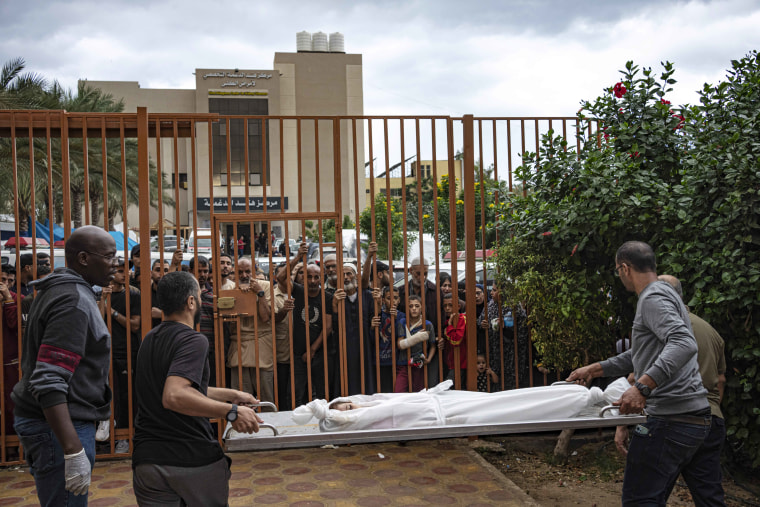
“Today, there is no time for prayers,” Elshorbagy said, referencing the typical afternoon prayers performed collectively ahead of a burial service. “They can’t take him home and say goodbye as it was before.”
With many mosques destroyed or under threat of attack, impromptu funeral prayers are being held in hospital courtyards or on the streets. Attendance is close to none at the burial site itself.
“They bury them fast,” said Abu Obaid, the local videographer.
The moment that families learn their loved ones have been killed are filled with “screams, sadness and shock,” he said.
“It’s excruciating feelings that shake the heart,” he added.
But with news of death or fears of impending death ubiquitous across the enclave, in many cases there is no final goodbye. Abu Obaid said that his cousins were killed in an airstrike on their home a week ago, but that he was unable to attend the burial because of ongoing heavy bombardment.
“I was far from the hospital. I couldn’t see any of them,” he said.
Graves and grief
Identifying certain corpses is an ordeal in itself.
Hospital staff and locals say it can take several days before a family member can identify a body because most of the dead have disfigured limbs and “very critical” amputations of hands and legs. Clues like a certain birthmark on the face or the clothing they were wearing have helped some families identify their lost loved ones, Elshorbagy added.
Other times, the morgue worker said, they have received 2 to 3 kilograms of “shattered bones or flesh,” which were unidentifiable. In those cases, they were grouped with other dead bodies of known family members and not buried individually, he said.
Some families have resorted to writing their children’s names in marker on their limbs, in the hope they will be identifiable if they are killed. Other families in Gaza have started wearing ID bracelets.
But identifying the dead is only one problem. Finding space to bury them is another.
Jihad Elshamali, a gravedigger at several cemeteries along the Gaza Strip, said he’s worked on burial plots in recent weeks bearing numbers rather than family names.
“Frankly, the situation is very tragic,” said Elshamali, adding he had at times buried up to 15 people in one cemetery plot.
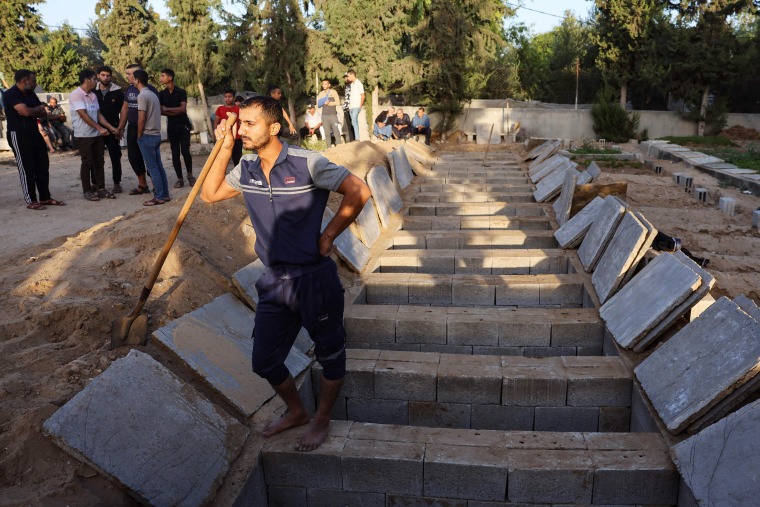
He said the amount of missiles sweeping over Gaza has left him so fearful, he sometimes allows families to “risk their lives” to bury their family members without him.
The lack of fuel, water and resources coming into Gaza because of the Israeli-imposed siege has led merchants to jack up prices for needed burial goods such as cement, tiles and brick, said Elshamali, stifling his ability to do his job.
“We can’t even find water to mix the clay to make a grave cover.”
Though families here have long been familiar with the prospect of death, the current situation has exacerbated the suffering of Palestinians in Gaza who take pride in observing their traditions.
“In the past, everything was available for the burial ceremony. They came to bury with dignity,” ElShamali said.
And for Palestinians who live abroad, like Mohammad Malaka, the only closure available is through piecemeal social media video updates circulating of his dead relatives.
A recent Facebook reel showed some of his family members were finally put to rest, only for him to find out, through a tweet, that more of his extended family members were injured and killed in a subsequent airstrike.
“This is not about the Malaka family, this is just one story of the thousands of Palestinian families going through the same pain,” he said.
“We’re not allowed to even grieve.”

